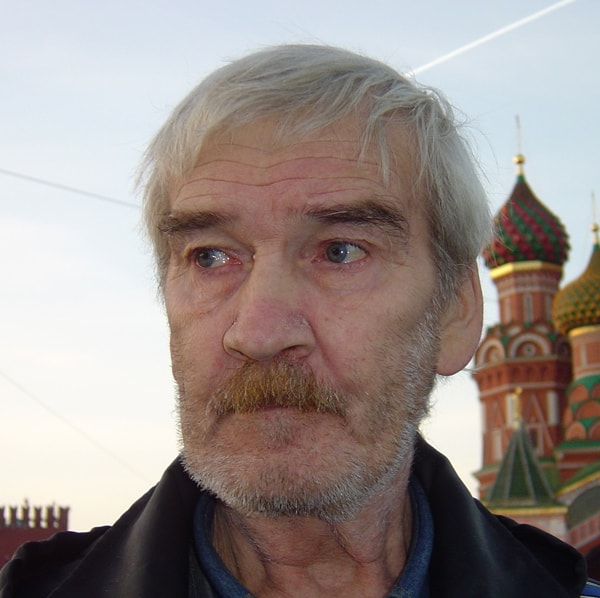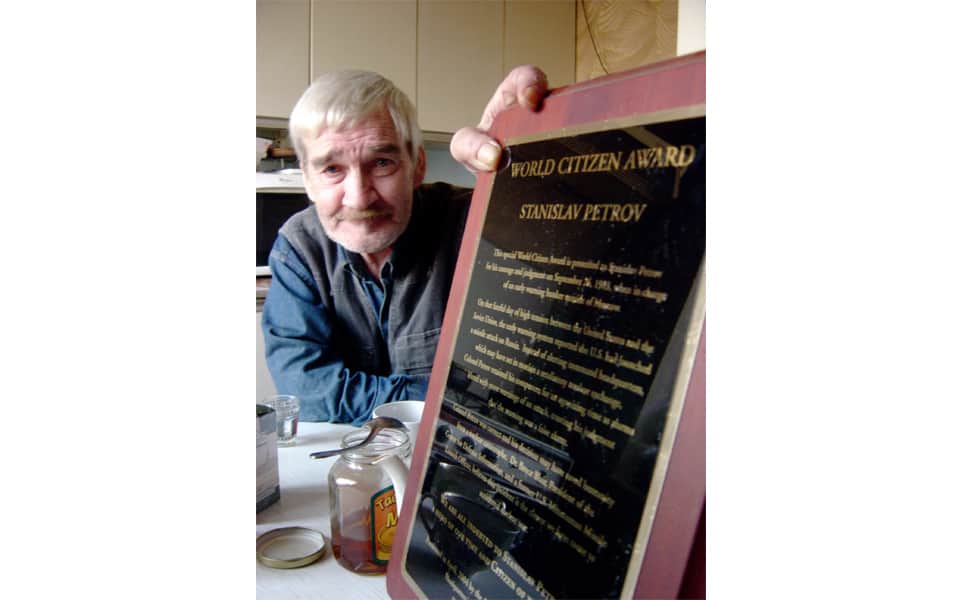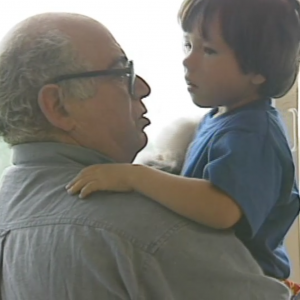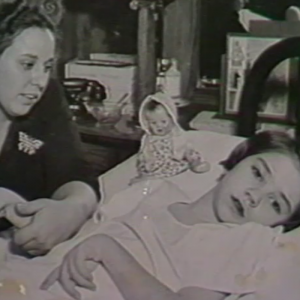The Red Button
$19.99 – $199.99
Educational DVD $199.99
Click below description to buy
The Red Button is a 52-minute documentary film that tells the dramatic story of Stanislav Petrov, the Russian officer who, in 1983, saved the world from atomic war.
During the early ‘80s, the Russian leader was Jurij Andropov, the most right-wing Soviet leader since Stalin. A known hardliner, Andropov was very wary of US activity.
It was an intense period of time in the relationship between the United States and Russia. Tensions were running high between the two superpowers, and the atmosphere was suspicious because of recent incidents. On September 5th, a Korean jet liner with 269 passengers, many of whom were American, had been shot down over Soviet territory because the Russians believed it was a spy mission. The action led Reagan to label Russia an “evil empire.” Soon after, the KGB communicated to the western operatives to prepare for possible nuclear war. It is now thought that throughout 1983, the Kremlin assumed that the US and its allies were planning a nuclear strike on the Soviet Union.
So it was in this tense environment that Stanislav Petrov worked deep inside Serpukhov-15, a secret bunker, monitoring early warning satellites. On September 26, 1983, Pietrow was in charge of monitoring American missiles that could potentially be sent to Russia to start a nuclear war. It was not his normal duty; he was to man the post twice a month just to keep his skills from getting rusty.
Shortly after midnight, Petrov noticed a missile on his screen. Thinking it was a possible error, he nervously ignored it and waited for any other indications of war. Several minutes later, things became much more serious: four more missiles appeared and a flashing red warning sign began asking him to confirm an incoming attack. By pressing the red button, Petrov would have sent the information up the chain of command to Jurij Votincev, the Commander in Chief of the Russian missile defense, and then to Jurij Andropov who was in charge of the new “nuclear suitcase” and who would have undoubtedly called for a counterattack.
Petrov knew he only had about fifteen minutes to decide what he would do before the missiles would reach the Soviet Union. If he didn’t pass the information along, Petrov would be ignoring orders and taking responsibility into his own hands. The protocol, which Petrov had written himself, clearly indicated that the correct course of action would be to inform the Commander in Chief. 120 panicked military officers and engineers sat behind him, looking at the screen and waiting for his decision. “Everyone jumped from their seats looking at me,” says Petrov. “What could I do? There was a procedure that I had written myself.” The future of the world was in the 44-year-old Russian officer’s hands as he wrestled with the decision of whether or not to use Russia’s atomic button. In a bold move, however, Petrov decided against it, blaming the signals on faulty equipment instead of imperialistic aggression. At the time, he was not sure he had made the right choice.
Fortunately for all of us, Petrov made the correct decision. His reasoning was that if the Americans were going to start an atomic war, they would have sent hundreds of missiles, not just five.
Although Petrov had effectively saved the world from atomic war, he was not rewarded for his decision by the Russian army. Instead, he was reprimanded for not filling out the log books on that day, and a year later he was given an option to retire.
When the incident was finally declassified in 1998, many members of world organizations claimed that Petrov was a hero, and some thought that he deserved a Nobel Prize. As a result of the publicity, he was rewarded by the The Association of World Citizens based in San Francisco with $1000 and given a plaque: ‘The World Citizen Award.’
Today, Petrov lives in a small village near Moscow in relative anonymity, surviving only on a tiny pension of $200 a month. He gave most of his reward money to his grandchildren and spent the rest on a vacuum cleaner, an item he had always dreamed of, which then turned out to be faulty.
While Petrov’s incident might sound extraordinary, the world has actually survived at least four false alerts for nuclear war in the past 20 years. Fortunately, in three of the four cases, reliable space-based sensors assured leaders that they were safe, even though their other systems falsely indicated a nuclear attack. Many world leaders believe, therefore, that such incidents demonstrate the need for both the US and Russia to have adequate space-based sensors in order to avoid a false response.
Even with such sensors in place, however, accidents are inevitable. In Petrov’s case, it was actually a relatively new Soviet satellite system that falsely indicated that nuclear annihilation was imminent. Shortly after midnight, the sun, the monitoring satellite system, and the U.S. missile fields all lined up in such a way as to maximize the sunlight reflected from high-altitude clouds. This gave the appearance, to Petrov, that several missiles had been launched from the U.S. continental missile fields. Although his suspicious superiors had repeatedly told Petrov that the United States would launch a massive nuclear strike against the Soviet forces, he decided not to pass the alert about the five missiles to higher authorities, saying, “When people start a war, they don’t start it with only five missiles. You can do little damage with just five missiles.”
Although Petrov’s action was the right one at the time, according to Dr. Bruce Blair of the US Center for Defense in Washington DC, his logic was not necessarily correct because one of the US’s plans was to launch just a few missiles to confuse the enemy.
Such a close call, however, illustrates the fact that there is still considerable room for human and technical error in systems, which keeps thousands of nuclear weapons on high-trigger alert and poised for rapid firing. To make things worse, the constellation of Russian early-warning satellites has been allowed to deteriorate significantly since 1995 because of insufficient maintenance funding. What is even more important, as stated by Bruce Blair “there is an urgent need to stand down these dangerous missiles and take them off alert in order to prevent a nuclear war from starting by mistake or by unauthorized action.”
The Red Button reviews Petrov’s role in the autumn equinox nuclear scare, discusses the repercussions of the event, and analyzes possible ways to prevent similar mistakes. By telling the story of this unsung hero’s life, this documentary will bring important issues about international security to light. Although this film is international in its perspective, the subject matter is very close to American audiences. The subject matter confronts the most vital and important themes for current security issues – for America as well as the rest of the world.









Reviews
There are no reviews yet.